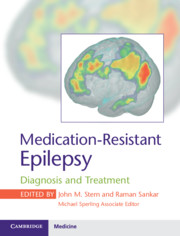Book contents
- Medication-Resistant Epilepsy
- Medication-Resistant Epilepsy
- Copyright page
- Dedication
- Contents
- Contributors
- Chapter 1 The Natural History of Epilepsy
- Chapter 2 Challenges in Identifying Medication-Resistant Epilepsy
- Chapter 3 International League Against Epilepsy’s Definition of Medication-Resistant Epilepsy
- Chapter 4 The Economic Impact of Medication-Resistant Epilepsy
- Chapter 5 Social Consequences of Medication-Resistant Epilepsy
- Chapter 6 Mortality and Morbidity of Medication-Resistant Epilepsy
- Chapter 7 Models for Medication-Resistant Epilepsy
- Chapter 8 Neurobiology of Medication-Resistant Epilepsy
- Chapter 9 Genetic Causes of Medication-Resistant Epilepsy
- Chapter 10 Malformations of Cortical Development as Causes of Medication-Resistant Epilepsy
- Chapter 11 Hippocampal Sclerosis as a Cause of Medication-Resistant Epilepsy
- Chapter 12 Autoimmune Causes of Medication-Resistant Epilepsy
- Chapter 13 Medication-Resistant Epilepsy Syndromes in Children
- Chapter 14 Medication-Resistant Epilepsy in Adults
- Chapter 15 Approach to the Treatment of Medication-Resistant Epilepsy
- Chapter 16 Pharmacotherapy for Medication-Resistant Epilepsy
- Chapter 17 Reproductive Health for Women with Medication-Resistant Epilepsy
- Chapter 18 Resective Surgery for Medication-Resistant Epilepsy
- Chapter 19 Ablative Surgery for Medication-Resistant Epilepsy
- Chapter 20 Stimulation Treatment for Medication-Resistant Epilepsy
- Chapter 21 Diet Therapy for Medication-Resistant Epilepsy
- Chapter 22 Botanical Treatments for Medication-Resistant Epilepsy
- Chapter 23 Psychiatric Comorbidities in Medication-Resistant Epilepsy
- Index
- References
Chapter 11 - Hippocampal Sclerosis as a Cause of Medication-Resistant Epilepsy
Published online by Cambridge University Press: 20 August 2020
- Medication-Resistant Epilepsy
- Medication-Resistant Epilepsy
- Copyright page
- Dedication
- Contents
- Contributors
- Chapter 1 The Natural History of Epilepsy
- Chapter 2 Challenges in Identifying Medication-Resistant Epilepsy
- Chapter 3 International League Against Epilepsy’s Definition of Medication-Resistant Epilepsy
- Chapter 4 The Economic Impact of Medication-Resistant Epilepsy
- Chapter 5 Social Consequences of Medication-Resistant Epilepsy
- Chapter 6 Mortality and Morbidity of Medication-Resistant Epilepsy
- Chapter 7 Models for Medication-Resistant Epilepsy
- Chapter 8 Neurobiology of Medication-Resistant Epilepsy
- Chapter 9 Genetic Causes of Medication-Resistant Epilepsy
- Chapter 10 Malformations of Cortical Development as Causes of Medication-Resistant Epilepsy
- Chapter 11 Hippocampal Sclerosis as a Cause of Medication-Resistant Epilepsy
- Chapter 12 Autoimmune Causes of Medication-Resistant Epilepsy
- Chapter 13 Medication-Resistant Epilepsy Syndromes in Children
- Chapter 14 Medication-Resistant Epilepsy in Adults
- Chapter 15 Approach to the Treatment of Medication-Resistant Epilepsy
- Chapter 16 Pharmacotherapy for Medication-Resistant Epilepsy
- Chapter 17 Reproductive Health for Women with Medication-Resistant Epilepsy
- Chapter 18 Resective Surgery for Medication-Resistant Epilepsy
- Chapter 19 Ablative Surgery for Medication-Resistant Epilepsy
- Chapter 20 Stimulation Treatment for Medication-Resistant Epilepsy
- Chapter 21 Diet Therapy for Medication-Resistant Epilepsy
- Chapter 22 Botanical Treatments for Medication-Resistant Epilepsy
- Chapter 23 Psychiatric Comorbidities in Medication-Resistant Epilepsy
- Index
- References
Summary
Hippocampal sclerosis (HS) is the most frequent aetiology for medically refractory epilepsy [1]. It was first described by Bouchet and Cazauvielh in 1825 on pathological examination of a patient who had died following seizures [2]. In 1880, Sommer studied pathological samples from over 90 patients with chronic epilepsy, and reported gliosis and pyramidal cell loss in the hippocampus, predominantly in the CA1 region, originally known as Sommer’s sector. He proposed that these abnormalities were the cause of the epilepsy. In 1889, Jackson associated focal lesions in the hippocampus with the clinical symptoms of temporal lobe seizures. In addition to the loss of pyramidal cells, the loss of hilar interneurons was recognized as an important feature [3] and is dominant in the type of pathology that came to be described as end-folium sclerosis [4]. Loss of both inhibitory gamma-aminobutyric acid (GABA) neurons and excitatory mossy cells in the hilus reduces their control of the dentate granule cells, and such loss of neurons in the hilus (sometimes included as part of CA4) is one of the most consistent findings in TLE [5,6]. The International League Against Epilepsy has proposed a classification of the distinct patterns of HS to correlate the type of pathological changes to post-surgical outcome [7]. In the 1950s with the development of electroencephalography, HS was linked to electrophysiologic temporal lobe seizures.
- Type
- Chapter
- Information
- Medication-Resistant EpilepsyDiagnosis and Treatment, pp. 87 - 99Publisher: Cambridge University PressPrint publication year: 2020

